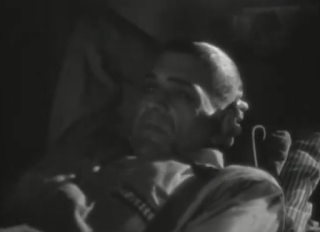Errol Flynn did not receive an Oscar nomination for portraying Jean Picard in Uncertain Glory.
Uncertain Glory is a better than average patriotic piece, which were so common in this period, here about a career criminal who decides to take the fall for a French saboteur during world war 2 rather than face the guillotine for his crimes.I'll admit this performance is big reason I decided to do the lineup as I felt I had to review this turn from Flynn as it is so atypical for him in a lot of ways. Although Flynn often played a lot of charming pseudo rogue we always knew they were heroes at heart from the outset. Although this character might get to that point eventually, we get a side from Flynn entirely different from his typical presence. This as the film opens with his Picard awaiting execution where we first meet him as he refuses to shave his neck for the guillotine. Flynn's snap delivery in the refusal grants a surprising intensity from the performer who typically granted a more light weight approach to his roles. Here though Flynn shows a real bitterness within the man's manner with his eyes filled with a hate for his captors, and a general derision that he naturally exudes. An ideally time bombing raid though allows Picard to escape, where again we find Flynn in unlikely waters as he finds the home of an old friend. here though Flynn plays into his usual charm however now weaponized towards a wholly different sort of man. This with his easy going manner played within a different light. Flynn is genuinely charming of course with his always dynamic presence, however his eyes grant it a different quality. There's a sneering menace even in his calm delivery as threatens his friend, while smiling. This though only followed as seduces his friend's girlfriend. Flynn of course convincing in the ease of this, but even more so remarkable here though in the devious cunning he grants the moment. Flynn not easing on the edges of the role but rather embracing the man of Picard as a truly despicable sort.
His escape is short lived though as he is quickly caught dogged Inspector Bonet (Paul Lukas), who intends to take him back to be executed. Even in this it is interesting to see Flynn approach these scenes with a wry sort of cynicism that is quite different from his usual optimistic heroes. The thing is though Flynn wholly pulls it off here and grants an effective dynamic between himself and Lukas, who is also quite good in portraying his character's blunt righteousness. The two though are given a strange opportunity when they hear that the occupying Nazis intend to kill 100 random French unless a recent saboteur exposes himself first. Flynn's terrific in hearing this news as he suggests the idea that he take the place preferring the firing squad over guillotine as a form of death. Flynn doesn't play this as a sudden change of heart, rather layers it on top with a soft delivery of suggesting some virtue in Picard but only to try to convince Bonet in the moment. Flynn still has the slick glint in his eyes of a man trying really anything to give himself opportunities to escape his likely fate. This leads the two towards a small French town to await and prepare Picard to turn himself in for his false crime in order to atone for his real ones. Here Flynn broaches more typical material for him, as we see a minor romance, and really opportunities for him to be more overtly charming.
Flynn though doesn't excuse his character in these scenes and doesn't suddenly shift his performance. He tempers his work towards a more insulated charm of a man with a constant secret alluding towards the man's criminal element even as he seems to change. As this goes on though there is no quick shift here actually for Flynn's performance, which is remarkable. Flynn I often found most struggled with the most purely earnest moments of selling a philosophy in his other performances, like selling the virtues of King Richard in Robin Hood for example, but he does great with them here. One of the big reasons being he wholly changes his typical approach. This as we get a scene where he has convinced Bonet that he's changed to some degree and explains it. It is with a nearly passive tone of a man recognizing his faults. This though instantly subverted a moment later where Flynn unabashedly grins showing Picard's "confession" to Bonet being no more than a lie in an attempt to escape any type of execution. Nonetheless a series of events still wear down on Picard to eventually change his mind for real, but what is great here is how Flynn plays the scene of the true change against the false. This as Flynn goes on almost an attack of explaining the whole idea of the virtues of the saboteur with the viciousness of his earliest scenes. This in a way showing the man being honestly himself even when speaking a new truth to himself. This scene presenting the man convincing himself through essentially a realization of a hatred of himself. Flynn realizing the transformation of his character with a quiet power and artfully avoiding the typical pitfalls one finds in his work. This is a wholly different performance from Flynn utilizing his virtues as a performer but through another, even more dynamic, lens.
















